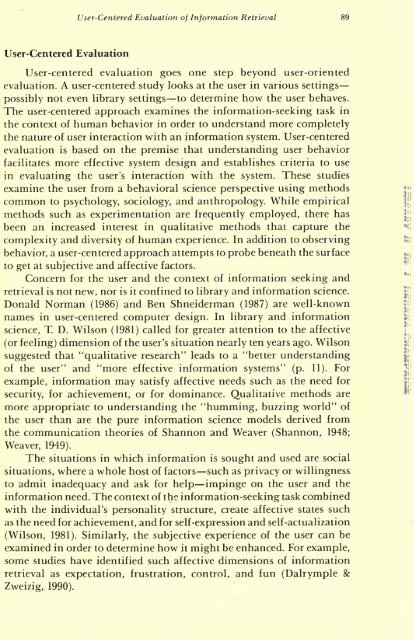User-Centered Evaluation of Information Retrieval - ideals
User-Centered Evaluation of Information Retrieval - ideals
User-Centered Evaluation of Information Retrieval - ideals
You also want an ePaper? Increase the reach of your titles
YUMPU automatically turns print PDFs into web optimized ePapers that Google loves.
<strong>User</strong>-<strong>Centered</strong> <strong>Evaluation</strong> <strong>of</strong> <strong>Information</strong> <strong>Retrieval</strong> 89<br />
<strong>User</strong>-<strong>Centered</strong> <strong>Evaluation</strong><br />
<strong>User</strong>-centered evaluation goes one step beyond user-oriented<br />
evaluation. A user-centered study looks at the user in various settings<br />
possibly not even library settings to determine how the user behaves.<br />
The user-centered approach examines the information-seeking task in<br />
the context <strong>of</strong> human behavior in order to understand more completely<br />
the nature <strong>of</strong> user interaction with an information system. <strong>User</strong>-centered<br />
evaluation is based on the premise that understanding user behavior<br />
facilitates more effective system design and establishes criteria to use<br />
in evaluating the user's interaction with the system. These studies<br />
examine the user from a behavioral science perspective using methods<br />
common to psychology, sociology, and anthropology. While empirical<br />
methods such as experimentation are frequently employed, there has<br />
been an increased interest in qualitative methods that capture the<br />
complexity and diversity <strong>of</strong> human experience. In addition to observing<br />
behavior, a user-centered approach attempts to probe beneath the surface<br />
to get at subjective and affective factors.<br />
Concern for the user and the context <strong>of</strong> information seeking and<br />
retrieval is not new, nor is it confined to library and information science.<br />
Donald Norman (1986) and Ben Shneiderman (1987) are well-known<br />
names in user-centered computer design. In library and information<br />
science, T D. Wilson (1981) called for greater attention to the affective<br />
(or feeling) dimension <strong>of</strong> the user's situation nearly ten years ago. Wilson<br />
suggested that "qualitative research" leads to a "better understanding<br />
<strong>of</strong> the user" and "more effective information systems" (p. 11). For<br />
example, information may satisfy affective needs such as the need for<br />
security, for achievement, or for dominance. Qualitative methods are<br />
more appropriate to understanding the "humming, buzzing world" <strong>of</strong><br />
the user than are the pure information science models derived from<br />
the communication theories <strong>of</strong> Shannon and Weaver (Shannon, 1948;<br />
Weaver, 1949).<br />
The situations in which information is sought and used are social<br />
situations, where a whole host <strong>of</strong> factors such as privacy or willingness<br />
to admit inadequacy and ask for help impinge on the user and the<br />
information need. The context <strong>of</strong> the information-seeking task combined<br />
with the individual's personality structure, create affective states such<br />
as the need for achievement, and for self-expression and self-actualization<br />
(Wilson, 1981). Similarly, the subjective experience <strong>of</strong> the user can be<br />
examined in order to determine how it<br />
might be enhanced. For example,<br />
some studies have identified such affective dimensions <strong>of</strong> information<br />
retrieval as expectation, frustration, control, and fun (Dalrymple &<br />
Zweizig, 1990).
















